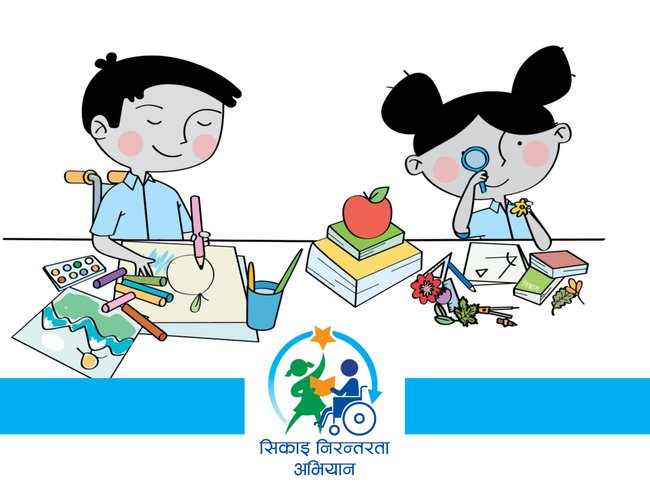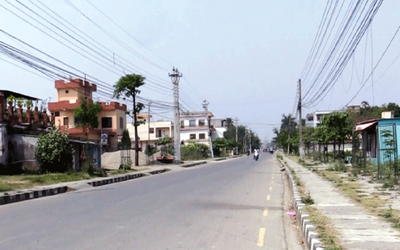
The Government of Nepal and partners have today launched aneducation campaign to help children continue to learn safely in the context of the COVID-19 pandemic and beyond, through guidance on safe reopening of schools and the use of alternative education modalities.
At the height of nationwide and local lockdowns enforced in response to the pandemic in Nepal, the learning of nearly 8.5 million schoolchildren was put at risk by prolonged closures of educational facilities. While schools have begun to reopen in some areas where local governments have deemed the risk of COVID-19 as being low or under control, the persistent risk of infection in many other regions continues to pose a challenge to reopening efforts.
It is in this context that the Learning Continuity Campaign has been developed, in alignment with the Emergency Action Plan related to School Education 2077 by the Ministry of Education, Science and Technology’s Center for Education and Human Resource Development (CEHRD), in partnership with UNICEF Nepal, the School Management Committee Federation, Confederation of Nepalese Teachers and Nepal Education Cluster. The campaign is being launched in collaboration with CMC Nepal, Educational Pages, ENPHO, Plan International, Save the Children, Setogurans National Child Development Services, United Mission to Nepal, UKAID through BBC Media Action,USAID’s Early Grade Reading Program II, VSO, and World Education. Coordination is underway to bring other partners on board.
In line with the Government's framework for reopening schools in the context of COVID-19, the campaign engages parents, caregivers, teachers, school authorities and local governments – as well as children themselves – with information on the standard public health security protocols to prevent the spread of infection in areas where schools have reopened. The campaign also encourages the effective use of alternative education modalities to help ensure children keep learning during this challenging time. The campaign has a specific focus on marginalised children, especially girls and boys from poor, remote and disadvantaged groups who require additional and targeted support to continue learning and prevent them from droppingout.
“The campaign expects to create a facilitative environment for children as per available services and ensure the learning rights of all students,” said Mr. Ghanshyam Aryal, Director of the Center for Education and Human Resource Development.
CEHRD has been working closely with provincial and local governments, and partners, to establish a number of alternative education modalities. As per the Government’s guidelines to facilitate learning through alternative systems, these modalities are based on the categorization of students into five groups: (i) those with no access to media; (ii) with access to radio; (iii) those with access to television; (iv) those who have access to computers but lack internet connectivity; and (v) those with internet connectivity.
The Learning Continuity Campaign places a strong focus on ensuring effective use of these modalities, which include plans to mobilize teachers in utilizing low-tech mechanisms like telephone/SMS-based activities to enable closed user group service through Nepal Telecom. And recognizing the critical role played by parents in children’s education, the campaign will also promote parenting education through a dedicated radio programme, along with formation of parents’ groups to support learning and use of a home-schooling modality.
“The alternative education modalities that are being developed and promoted as part of the Learning Continuity Campaign are likely to prove valuable not just for children who are being impacted by school closures, but also in places where schools have opened to help children make the transition,” said Elke Wisch, UNICEF Representative to Nepal. “Providing teachers, parents and school authorities with these guidelines, learning tools and approaches will also be key to ensuring children keep learning in the case of future crises.”
- Nepal Army Held National Cyber Security Symposium
- Apr 26, 2024
- Nepal’s Investment Landscape Revitalize By Nine Ordinances: FNCCI President Dhakal
- Apr 26, 2024
- Weather Forecast: Partly Cloudy In Hilly region And Mainly Fair In Plain Areas
- Apr 26, 2024
- Nepal-China Aid Project Meeting Held In Lhasa
- Apr 25, 2024
- Ambassador Subedi Presented The Letter Of Credence To President Of Italy
- Apr 25, 2024
















